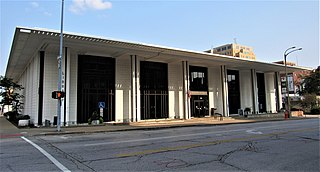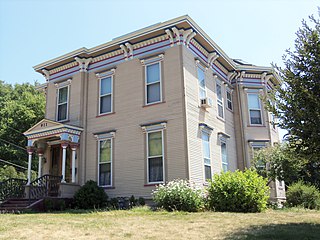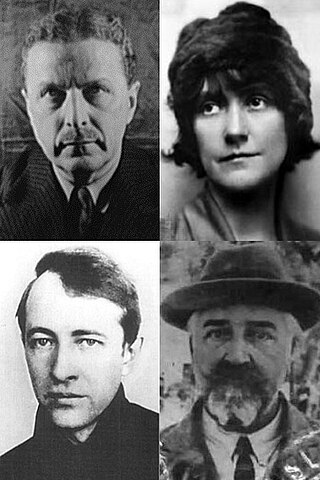Related Research Articles

Bacon's Castle, also variously known as "Allen's Brick House" or the "Arthur Allen House" is located in Surry County, Virginia, United States, and is the oldest documented brick dwelling in what is now the United States. Built in 1665, it is noted as an extremely rare example of Jacobean architecture in the New World.

Alice French, better known as Octave Thanet, was an American novelist and short fiction writer.

The Village of East Davenport, also known simply as The Village, is located along the Mississippi River on the southeast side of Davenport, Iowa, United States. It was listed as a historic district on the National Register of Historic Places in 1980 as the Davenport Village. At the time of its nomination it included 145 contributing properties, most of which were working-class housing.
Clover Bend is an unincorporated community in Lawrence County, Arkansas, United States. It is the location of two historic sites listed on the U.S. National Register of Historic Places: the Clover Bend High School, on Arkansas Highway 228 (AR 228), and the Clover Bend Historic District, at the junction of AR 228 and Co. Rd. 1220.

The Davenport Public Library is a public library located in Davenport, Iowa. With a history dating back to 1839, the Davenport Public Library's Main Library is currently housed in a 1960s building designed by Kennedy Center architect Edward Durell Stone. The Davenport Public Library system is made up of three libraries—the Main Library at 321 Main Street; the Fairmount Branch Library at 3000 N. Fairmount Street (41°33′06″N90°37′54″W); and the Eastern Avenue Branch Library at 6000 Eastern Avenue (41°34′59″N90°33′12″W).

The McClellan Heights Historic District is a 188.2-acre (76.2 ha) historic district in Davenport, Iowa, United States. It was listed on the National Register of Historic Places in 1984, at which time it included 354 buildings deemed to contribute to the historic character of the area.
Alice French House may refer to:

St. Katherine's Historic District is located on the east side Davenport, Iowa, United States and is listed on the National Register of Historic Places. It is the location of two mansions built by two lumber barons until it became the campus of an Episcopal girls' school named St. Katharine's Hall and later as St. Katharine's School. The name was altered to St. Katharine-St. Mark's School when it became coeducational. It is currently the location of a senior living facility called St. Katherine's Living Center.

The Cork Hill District is a nationally recognized historic district located in Davenport, Iowa, United States. It was listed on the National Register of Historic Places in 1984. The historic district covers 18.7-acre (7.6 ha) and stretches from the campus of Palmer College of Chiropractic on the west to the Sacred Heart Cathedral Complex on the east. It is the western half of a neighborhood of the same name. When listed, the district included 12 contributing buildings. It includes Greek Revival, Italianate, and Victorian architecture. The district was covered in a 1982 study of the Davenport Multiple Resource Area and/or its 1983 follow-on.

The Donahue Building is a historic building located in downtown Davenport, Iowa, United States. It was individually listed on the National Register of Historic Places in 1983. In 2020 it was included as a contributing property in the Davenport Downtown Commercial Historic District.

The Alice French House is a historic building located on a bluff overlooking the Mississippi River on the east side of Davenport, Iowa, United States. It has been listed on the National Register of Historic Places since 1983.

The Bridge Avenue Historic District is located in a residential neighborhood on the east side of Davenport, Iowa, United States. It has been listed on the National Register of Historic Places since 1983. The historic district stretches from River Drive along the Mississippi River up a bluff to East Ninth Street, which is near the top of the hill.

The Burtis–Kimball House Hotel and the Burtis Opera House were located in downtown Davenport, Iowa, United States. The hotel was listed on the National Register of Historic Places in 1979. It has since been torn down and it was delisted from the National Register in 2008. The theatre building has been significantly altered since a fire in the 1920s. Both, however, remain important to the history of the city of Davenport.

The James E. Lindsay House is a historic building located on the east side of Davenport, Iowa, United States. It has been listed on the National Register of Historic Places since 1984.

Clifton is a historic building located in the West End of Davenport, Iowa, United States. The residence was individually listed on the National Register of Historic Places in 1979. It was included as a contributing property in the Riverview Terrace Historic District in 1983.

Oakdale Memorial Gardens, formerly Oakdale Cemetery, is located in east-central Davenport, Iowa. It contains a section for the burial of pets called the Love of Animals Petland. In 2015, the cemetery was listed as an historic district on the National Register of Historic Places, and as a local landmark on the Davenport Register of Historic Properties. It is also listed on the Network to Freedom, a National Park Service registry for sites associated with the Underground Railroad.

Powhatan Historic State Park is a 9.1-acre (3.7 ha) Arkansas state park in Lawrence County, Arkansas in the United States. The park contains the 1888 Powhatan courthouse which served as the home of county government from 1869 to 1968. Today the structure displays items of cultural and historical significance and hosts the park's Visitor Center. The park includes four additional historical buildings and the Arkansas History Commission's Northeast Arkansas Regional Archives. A tour of the historic structures is available. Powhatan served as an important stop for traffic on the Black River until the installation of the Kansas City-Memphis Railwayline two miles north in 1883 significantly decreased the need for river transportation.

The Clover Bottom Mansion is a historic mansion located in Nashville, Tennessee, United States. It is the home of the Tennessee Historical Commission, the State Historic Preservation Office.

The Davenport Group is the informal name of a nationally known group of early modernist writers who first came together in Davenport, Iowa. In the early 20th century, they migrated east to New York City to assume leading roles in several important artistic and cultural developments in the 1910s and 1920s. Core members of the group are Susan Glaspell, her husband George Cram Cook, who were among the founders of the Provincetown Players; Floyd Dell, and Arthur Davison Ficke. Other Davenport writers associated with the group include Alice French, Charles Eugene Banks, Nilla Cram Cook, and Harry Hansen.

Lura Eugenie Brown Smith was an American journalist, newspaper editor, and author. She wrote short stories, poems, and miscellany, and did editorial work in newspapers. She was the author of Victory's Divorcement and On the Track and Off the Train (1892), and the editor of The Autocrat of Arkansas (1883).
References
- 1 2 "National Register Information System". National Register of Historic Places . National Park Service. March 13, 2009.
- ↑ Roba, William; Anderson, Fredrick I. (1982). Joined by a River: Quad Cities. Davenport: Lee Enterprises. p. 7.
- 1 2 3 "History of Clover Bend". Clover Bend Historical Preservation Association. Archived from the original on March 8, 2014. Retrieved March 8, 2014.
- ↑ "Clover Bend Historic District". Encyclopedia of Arkansas. Retrieved March 8, 2014.